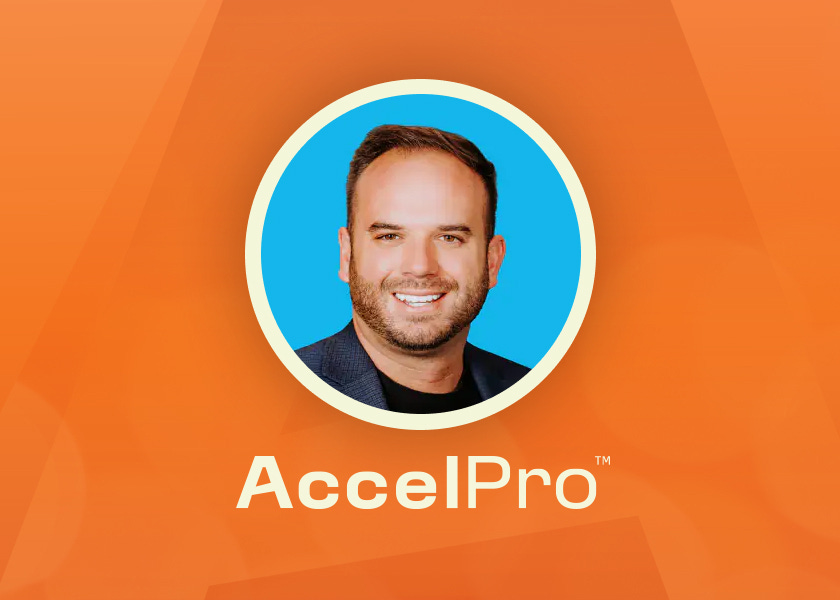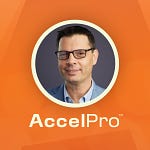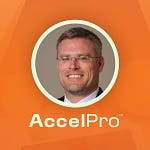Listen on Apple Podcasts, Spotify and YouTube
Welcome to AccelPro Audit, where we provide expert interviews and coaching to accelerate your professional development. Today we’re featuring a conversation about digital transformation in the accounting and audit space. Our guest is Ben Richmond, Country Manager, United States at Xero, one of the leading providers of cloud-based accounting software.
The work of auditors and accountants used to be mostly done with a whole lot of Excel. Now thousands of apps and platforms are emerging promising to move that work to the cloud and automate much of it. What opportunities does that present for auditors? What challenges and pitfalls? And what about the hype around AI and machine learning?
Richmond offers a step-by-step pathway from where firms are now, to a fully digital future and talks about how new tech tools can open up new revenue-generating opportunities, ease staff shortages and improve relationships with clients. Realizing these benefits, he cautions, requires openness to innovation, attention to security concerns and a renewed focus on empathy and soft skills, in addition to tech competence.
Listen on Apple Podcasts, Spotify and YouTube
Interview References:
Ben Richmond’s Xero profile and LinkedIn.
8:02 | Akoya.
8:17 | Executive Order on Promoting Competition in the American Economy. (9 July, 2021). The White House.
8:35 | Yodlee.
8:35 | Plaid.
8:35 | Flanks.
10:17 | SOC 2 - SOC for Service Organizations: Trust Services Criteria. AICPA & CIMA.
10:19 | ISO Standards. International Organization for Standardization.
TRANSCRIPT
I. MOVING TO THE CLOUD: OPPORTUNITIES AND PITFALLS
Jessica Stillman, Host: Can you talk us through why you see moving to the cloud being so significant for accountants and bookkeepers and what that means for the growth and evolution of their practices?
Ben Richmond: Xero’s founding vision was that the cloud created a connection between the small business and the client that had never been able to exist before. Small businesses are running their systems, and accountants would generally bring their data in at the end of the year and do their work. These two ledgers were never running in harmony, and so your clients were sailing off doing their own thing throughout the year and you couldn't see them, which meant you couldn't proactively help.
So bringing everyone onto the cloud brought everyone to a single ledger or a single source of the truth that everyone could work within and do their own workflows. It really opened up this whole new opportunity for accountants to have extra capacity from being able to do things more efficiently and that connection and that capacity meant that suddenly they could start to check in with the client regularly to see if cashflow looks good or not. It opened up this opportunity for accountants to really lean in, support and be true advisors.
It's created new revenue streams. The profession has transformed remarkably. Tax is still important. All things we've always done are still important, but they're done more efficiently, more quickly and almost like end-year byproducts. Now we're spending more time on being able to add true value to small businesses that we support.
Secondly, if you think about the old desktop world, you either had one size fits all software that you would buy in a box, or use a lot of Excel, and that's generic. If you think about a cafe owner, a plumber, a farmer, they're all very different businesses, so the cloud also opened up this open platform ecosystem, which meant that you could have this best of breed accounting platform and then connect industry-specific apps.
We're seeing this awesome transition. The profession is going from nailing the basics to being true advisors around technology and educating businesses, understanding what verticals they're going after, building technology stacks, creating massive process efficiencies for their clients. They are becoming true managed service shops for small business and at scale. The impact they can have on the small business economies is really exciting. And so I think we've got some work to do to almost rebrand the profession.
JS: In an interview from 2020 you said only around 20% of US small businesses are actually using cloud accounting. I'm sure that has changed a bit since then, but it struck me as surprisingly low. Can you give an up-to-date picture of how many businesses have moved to the cloud, and what factors are holding them back given that there are these efficiencies to be had?
BR: It hasn't moved much, to be honest. I don't have the up-to-date stat, but I can share some insights around how we got to it. Xero's a global company. We were founded out of the Southern Hemisphere, and what we've seen down there is there's been about 50% digital adoption of accounting by small businesses in the Australian and New Zealand markets, which is huge.
Why has that happened and why are we not seeing more uptake? There's a few reasons. One, Excel is still the number one accounting solution in the US, and it's kind of scary how many serious businesses will still run cash-based accounting. In a lot of the Commonwealth countries — when you think Australia, New Zealand, UK, Canada — those tax authorities require small businesses to produce a set of financial statements to support the tax return, which means you have to keep records and you have to engage in accrual accounting, not just bank statement cash accounting.
Here in the US you're not, unless you're a certain size (which is quite big), where things like having to produce US GAAP compliant accounting comes in. So what that's meant is there hasn't been a regulatory need for small businesses to engage in accrual accounting. Again, it’s quite scary how many small businesses that have complexities are just running their business based on cash in and cash out.
What we've seen here in the US is much faster adoption of the front end systems. For example, I was at a little caravan that was selling barbecue, and I can guarantee this business is still running on a spreadsheet, but they had the iPad as the cash register.
So we've seen much faster adoption at the front end. But the backend accounting is still either sitting in Excel or not being run. I'm speaking to accountants and auditors so they get what I'm saying, right? But for small business accrual versus cash, they don't really understand what that means.
So there's a massive education journey, and it's actually helping small businesses understand that if you're not running accrual accounting, you don't actually have a true picture of the business. If I'm a small business owner that sells goods and cashflow looks bad, I decide, “Hey, look, I'm going to have a whole lot of sales. I'm going to drop the price and create some cash.” The cash budget is going to look amazing. You're not going to see the true picture. If I'm running accrual accounting, it's going to take into account that I've just sold all that product at a very low margin. At some point, I'm going to have to go and buy and restock the shop. And the overall true profit is not good.
And so this is where it gets dangerous if you're running a business that you want to be sustainable. Just running cash is not healthy. We need to de-jargonize it to small business. And I think that's the challenge for us here in the US.
I often see accountants are the number one trusted advisor to small business, but we often don't capitalize on that. We often wait for them to ask us, what should they use? I think we need to realize that they trust us and there's a much bigger role for us to play around helping them understand the right technology to be on and how they should be running their business from an accounting perspective.
—
II. AUTOMATION AND DATA SECURITY
JS: There are differences in accessing bank data in America compared to open banking systems like in New Zealand. Can you talk to us about what that means for systems like yours and for accountants that are using them?
BR: It's an industry-wide challenge here in the US, and it's one all the players in the space are going to be working on for a very long time. I wouldn't say it's anyone's fault—that’s the scale of the US, right? We're talking nearly 9,000 banks, and if you think of the financial crisis in 2008, there were bank mergers and they were done quickly, and IT platforms weren't merged. And so, there's real technical gaps.
There’s been lots of progress, though. They had the open banking legislation in the UK, which said, “Hey, customers want data at their request. Being able to move into the system and use tools that are important for them is key, and we're going to have a common framework for that. And then vendors that can get access to that also have to be certified.”
So that created a massive step forward for financial technology tools to get that data flow going. The UK is probably the most advanced in that space. Australia and New Zealand, they've got the scale advantage, right? There's about five key banks in New Zealand and they're owned by the five key banks in Australia. And because they're small, there's a lot of JVs around how they share data.
Here in the US there's some exciting things emerging. A few of the big banks got together and formed a joint venture called Akoya, and Akoya is going to be a platform that the fintechs like us can go and partner with and build technology to integrate with them. So that's private industry trying to get ahead.
We’ve seen the Biden administration do an executive order around trying to progress open banking. Anything to do with the federal government takes a long time. But that’s exciting to see them calling that out as a priority. I think we’re still many years away from seeing real progress on that.
Aggregators, tools like Yodlee, Plaid, Flanks, they're owning the problem to go and get as many direct integrations to them as they can and they screen scrape. So for us as fintechs, we have to look at utilizing the aggregators. We have to look at utilizing some of these new things emerging, like Akoya. And, of course, our big focus has been partnering directly with banks as well.
We've been focusing a lot on the top 10 to start with. Banks like Chase, Bank of America, Citi—we’ve built a bank feed API that's standard so that banks can build to us easily. And it's been cool to see a lot of accountants and bookkeepers that are partners of ours are actually championing us with their banks, “Hey, I need you to integrate better with Xero because this is how I support our mutual small business clients. And if you don't, I'll have to advise them to look at switching banks.”
Customers are starting to vote with their feet. Accounting software integration and integration to key fintechs is now one of the top three reasons why small businesses will move banks. And so that's actually driven banks to integrate with us through that API as well. It's a big challenge; most of the big banks are going really well, but we do know that small businesses in the US tend to also split their banking between the big banks and regional banks. Because at regional banking you are often going to get a deeper relationship with the bank manager. It’s just important that we solve that long tail of community banks as well.
JS: I also want to talk about cybersecurity and data privacy. Are they something that accountants should be factoring into their thinking?
BR: For most of our partners, it’s top of mind for them. For most of their small business clients, it’s becoming more and more important. And there’s two elements to it. One, I always say to businesses that the cloud is a safer way to do things, but you need to be really critical of the vendor.
If you're going to use Xero, we invest heavily. We know that trust and security of the platform is the number one thing we've got to be focused on. We're SOC 2 compliant, and have our ISO compliances. We're dealing with data switching between systems from the bank to Xero, and from Xero into the accounting platforms that the accountants do their work in. And so, it’s really important that all that data is encrypted to the latest standards.
But what I also say to small businesses is, if you think about the laptop on the backseat of your car or who really wants to see your information, it's probably one of your competitors and the server you are maintaining. And your building or the laptop is at much more risk of theft than trusting your data with scale platforms, which are hiring the best professionals in the world to maintain the security around that data.
On the accounting side, it's making sure that the platforms you are choosing to use security is top of mind, but it's also important that you are educating your small business clients. When you look at some of the top 100 accounting firms in the US, they're doing a lot more advisory in the space as well. You don't want the client bringing you a shoebox or emailing you attaching all the copies of their W2s because it's much easier for that to be hacked or taken.
No one likes two-factor authentication. We want to log in with our password and get going, but it's super important. We still see a lot of small businesses that are trying to avoid those tools. So educating your clients on security best practices, I think, is a big role we can also play.
JS: I know that Xero is trying to promote integrated tech stacks where accounting software is connecting to other apps that are gathering data to create a complete picture so people can make better business decisions. Could you talk us through an example?
BR: If you're an accountant running an accounting firm, there is a new way to run your practice. If you think about practice management, how you track time, the process, checklists you have for your jobs, how you collaborate with your clients’ workflows etc. So what we're seeing now is there's a whole technology stack with an ecosystem approach for accounting firms. Xero has best of breed apps for accountants, advisory apps, advanced reporting and cashflow dashboarding apps that they can run their clients on a GL system like ours.
On the small business side, we have over 1,200 apps now across different industries. It excites me because now when I think about small businesses and accountants, particularly the mid-size level and small level, they have access, in my view, to better technology than the big companies.
E-commerce is probably the one I'd use on the small business side. So many more people now that have a physical retail store are now also selling on the marketplaces, whether it be Amazon or Shopify. And so there's an inventory component for that. The data from those selling marketplaces is coming through connected to the accounting software. So you can then go, “What am I making a profit on?” And you've got your inventory sorted, you've got Gusto for payroll, and all those things are just connecting.
What accountants need to be thinking about with that is it's a tough landscape to navigate. If I'm the retail shop, going through and working out what's the right four to five technology tools to use for my business, is not what they're an expert in. And so what we're seeing with more accountants and bookkeepers is, after going to the cloud themselves, they're going, “Hey, let's pick two or three verticals that we want to become experts in.” Not just the tax legislation for those verticals, but now we’ve got people inside the practice that have lived and breathed in those verticals like real estate or e-commerce. We've got people that are experts in the technology stacks. So not only now are we doing the bookkeeping and tax, we're also helping our clients get on the right technology stack.
We're advising them on the right apps to bring in and how to integrate them; we're helping them understand how their processes need to change. Because you see a lot of people go from desktop to cloud and still try to run it like it's desktop, and that's become a new revenue stream for accountants. So that's my biggest advice for accountants is pick a couple of verticals, become experts in them, and then you really become the end-to-end managed service shop to help them, whether it's their tax, their bookkeeping, advising them on how to grow the segment and what the numbers mean, the right technology stacks to build and how to use those efficiently and to the best of their power.
—
III. THE THREE STEPS OF DIGITAL TRANSFORMATION
JS: That sounds like a great opportunity, but it also sounds like a pretty steep learning curve for a lot of accountants and bookkeepers. You said 1,200 apps there. That's a lot to sort through.
BR: So it’ll be challenging, right? I'm from the profession. I'm passionate about the profession. I'm actually passionate about challenging that we go faster and we can do a better job at this. So we have a good chunk of the early adopter market that are nailing this. They look totally different than the professional firm you would've walked into three to five years ago. The mass market still needs to go faster here. So that mass market's starting to look at how do we use cloud for our current processes today and become more efficient, and they're getting that connection to the client they didn't have, but they're still not seeing the opportunity to get out to this level, or they're trying to jump too much too far.
Everyone goes to all the conferences. They hear people like me talk and we all get excited. We talk about blockchain and crypto and ChatGPT, and people come out with their minds are scrambled, right? Because they're thinking, “I've got a big desktop practice, a loyal client base. Where do I start?”
I had a partner once walk to the Xero booth at an event and say to me, “I've just come out of the blockchain session and I'm really terrified.” And I asked about his practice, and he was 95% desktop. And I said, “Well, let's not worry about blockchain for now. That's exciting and it's coming, but let's actually just break it into a three-step journey.”
And those three steps are 1) I call it practice efficiency or digitization. So let's take the practice we have today and look at cloud platforms, practice management, the tough, boring stuff, the important stuff. The GLs we use, the way we interact with our clients, let's get them into the cloud to lower the cost of production on current business and current workflows. When we think about tax and some of the bookkeeping that we're doing, we see firms cut 40-60% of their production cost out, and that's giving them a huge amount of spare time.
Think about, What can we do next? The profession right now has massive staff shortages, so a lot of them need to cut that time just to survive on the staff levels they're at, then they move to stage 2) I break advisory out because this buzzword that we've run around using, no one can really explain it in the same way to me.
Break into simple advisory first. Let's start to take on more bookkeeping for our clients, because they don't want to do that anyway. What normally happens is the client brings us this hell of a mess at the end of the year. We call it write up. The secret is that's just doing the year's bookkeeping. So the clients run their accounting software; they're very proud. We're having to redo the whole thing. And so suddenly you are doing the work for them, which is great because it's clean and you know it's done right. They feel great because you're helping them out. You're connected to them and that means making a much more clean tax return at the end of the year and much more lucky for them to be with you.
And then the third thing is 3) you can see what they're doing and you can see where you can help, and that grows you further into that advisory advance. Let's start to engage with them more regularly. Let's help them with budgeting, cashflow scenarios. Best, worst, and likely, they're not new to us as accountants. We've only been able to do it on our big clients with a whole lot of Excel, but now we can take that type of service down to our smallest clients.
The third phase is complex advisory, and that's, you know, startup mentoring, capital raising assistance, picking key vertical niches. So what I've advised firms is work out where you are today and then start that journey. Don't jump from desktop to complex advisory because it'll be really hard.
—
IV. WHY SOFT SKILLS ARE MORE IMPORTANT NOW THAN EVER
JS: I know you started as an accountant and a treasurer and then shifted to the software client service side. So how did you decide to make that move and how did your experience as a practitioner earlier in your career prepare you to serve other accounting and audit professionals?
BR: It's funny when you go back and tell the story of your career; it sounds like it was perfectly planned and mapped out. It certainly wasn't. I grew up, half my family were farmers. The other half were small business entrepreneurs. So I watched my grandparents having arguments as we were trying to get in the car and drive off to the lake because my grandfather hadn't sent the invoices out.
I saw that pain firsthand. Then I had a very entrepreneurial mother who was really successful. She went bankrupt. She's a really ambitious, smart entrepreneur, but just didn't have strength around understanding the P&L or the financial aspects of the business. Her advisors let her down. They did a great job of trying to help her optimize tax, which you know, if you're losing money there's not really any need because there's no tax to pay.
I was going to go into accounting as a foundation based on those learnings of watching family and then sprinkle my career into other things from there. At least I'll understand the balance sheet, which, you know, if I want to go into corporate leadership or start something myself, having that financial foundation is really critical because a lot of people lack it.
I did that and it was really interesting. Our firm, we used to have paper work papers to do tax returns, so I built an Excel macro that you could drop an Excel trial balance into and populate all the work papers out, and we tried to roll that through the firm, and three staff threatened to quit and one partner wouldn’t take it on.
I remember once we used to have typists that had to type all our correspondence, and we had a business owner wanting to get their financial statements for a loan. And so I went, “This is ridiculous. I should be able to write a letter.” And I just got last year’s letter and just changed the amounts, which upset the typist hugely, but we just were so focused around processes and not changing things.
I knew that they were looked up to; I worked for a great firm, great people. They were great mentors, but I thought, these people trust us and we are not capitalizing on it, so I went into corporate telco after that. I did a bit of audit in my public practice time, which was fun, and we were US listed as well as Australia, New Zealand.
I got to run our SOX program for a while, which I enjoyed because we ran a lean program. Anywhere there's risk or process in audit, process grows like mold and sometimes you need to run a lean process across it and actually cut back. I was really excited because we managed to cut 40% of the control program out while getting the auditors to sign off that we had better risk protection.
And then Xero was emerging and it felt like the chance to go and help small business from the family element of it, and also a chance to help transform the accounting profession, which I was passionate about. It was a global story. It was growing rapidly across New Zealand and Australia and the UK. We sort of created the category for CAA accounting and CAAS accounting services, which we now see growing in the US, and so I jumped across and didn't look back.
It's been fun seeing firms go through the journey. Small business is the powerhouse of our economy. That's where all the jobs get made or lost, and if you can get them at scale on the right software, and if we could turn this profession at scale to be connected regularly in helping them, the macro impact we could do from that is huge. Accounting shouldn't be boring and small businesses shouldn't be scared of their accounting software.
JS: Is one of the takeaways there if you have an early career auditor or accountant, is that you should really get your tech skills in order?
BR: A bit of advice I always got was the first couple of years in your accounting career might feel like you're pulling your teeth when you're having to file files. You do a lot of the basic work when you start, right? And it's very easy to go, “This is too boring. I want to jump, do something more sexy.” But that foundation you build in doing that is really critical. And having that technical innovation makes you so much more powerful.
And then accounting has many different career paths, whether it be through audit, whether it be up in corporate, up to CFO; it actually can be a massive step to even broader things than that, the skillset you'll develop. The rigor and the process you'll develop, and the discipline, is actually a really good springboard to many other things that don't just have to be the accounting journey. Being close to the operation where the money comes in, or having that sort of finance innovation sets you apart from other executives that may have come in through other angles and not have that, so hang in there.
We need to rebrand it. The accounting profession today is not what it used to be. The barriers to entry are much lower — a laptop and a car and your certifications, you can go start your own firm. Customers don't expect us to have a big, fancy boardroom. They don't expect us to be in a suit. They want us to meet them where they are. They want us to understand their personal goals. It's much more soft skills that are needed for the profession now, and AI and all that sort of stuff that's coming down the track. That’s actually exciting. It was the doomsday predictors that said cloud's going to destroy the accounting profession. It hasn't. It's turned the accounting profession into a bigger revenue generator than it could ever have been.
AI brings its next set of challenges, but again, embrace AI so you can do better advisory. I don't want to be coding transactions anymore, right? The systems, if I type a description, should be able to code in.
Big companies need to be thinking about how they are going to embrace ChatGPT. Think of the functionality of a ChatGPT, but it's only connected into your systems, and so you're able to control it more. If that thing can be hooked into all your emails or your client records or work you've done and be starting to prompt you on things, therm it can be helping with your client interactions.
Auditing is up for really ripe disruptions. Most transactions are coming into the accounting software now, with electronic injection, which is encrypted. That includes the transaction and the source document. So the software now can validate that, “Hey, that came in automatically.” Is that transaction real and is there proof for it? The systems can already start to tell you that now because you can see what's coming in automatically that hasn't been manually interfered with, which is huge for fraud prevention. And then you've got source documents sitting on the transaction, which used to be a filing cabinet.
The new auditing tools around looking for risk, crawling through the data, looking for red flags. That used to be us scrolling through the GL and putting that into Excel, looking into variances.
Clients want to ingest stuff in an easy way. They didn't study accounting, so the reporting apps now are doing awesome things where they've got a franchise group, they’ll go into 400 different entities, pull out the data, shuffle through that, present it in a really visual format, showing who's performing better out of the group versus not.
So with just about every element of accounting, there's already solutions on the market. I think there's two open accounting jobs for every one candidate right now. We are going to need these tools and we can use these tools to get the boring stuff out of the way.
You know, with ChatGPT, if you're sitting in front of a husband and wife small business owners that need some advice, that are tense because the business is stressful, ChatGPT’s going to tell them the answer and tell them what they did wrong.
But you as the advisor have empathy. You can see the tension and you're going to give that advice. You might use ChatGPT to help generate the advice, but you can give that advice to them in a way that connects with them better. And so, don't fight these things. Learn them and embrace them so that you can know how to use them to your advantage.
This AccelPro audio transcript has been edited and organized for clarity. This interview was recorded on June 16, 2023.
Listen on Apple Podcasts, Spotify and YouTube
AccelPro’s expert interviews and coaching accelerate your professional development. Our mission is to improve your day-to-day job performance and make your career goals achievable.
Send your comments and career questions to questions@joinaccelpro.com. You can also call us at 614-642-2235.
If your colleagues in any sector of the audit field might be interested, please let them know about AccelPro. As our community grows, it grows more useful for its members.











